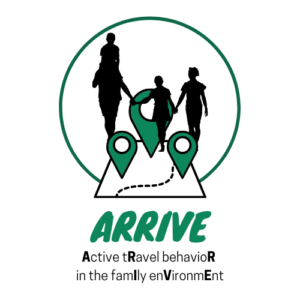ARRIVE
Active Travel Behavior in the Family Environment - ARRIVE
The ARRIVE project (Active tRavel behavioR in the famIly EnVironmEnt) aims to investigate the determinants of active transportation among youth, taking into account interrelationships between the individual characteristics, attitudes, and perceived barriers of youth and their parents.
project (Active tRavel behavioR in the famIly EnVironmEnt) aims to investigate the determinants of active transportation among youth, taking into account interrelationships between the individual characteristics, attitudes, and perceived barriers of youth and their parents.
Active transportation, i.e., walking, bicycling, or skateboarding/scootering, as a daily routine on, for example, the way to school or to sport activities, is an important domain of adolescents’ physical activity. However, previous research on active transportation primarily focused on elementary school age (6-10 years), considered only the way to school, and evaluated either the children’s or parents’ perspectives on socio-environmental determinants. Qualitative studies indicate that the family environment and family member interactions in particular influence extracurricular and unorganized leisure activities, including active transportation.
The aim of the ARRIVE project is to provide an in-depth understanding of active travel behavior to different destinations in the family context, which will be evaluated from a social-ecological perspective. The theoretical framework takes not only individual factors into account, but also the political level, as well as physical and social environmental factors.
For this purpose, a cross-sectional study with a mixed-methods approach will be conducted. In the quantitative study, the travel behavior of adolescents as well as determinants based on the “Conceptual Framework for the Environmental Determinants of Active Travel in Children” (Panter et al, 2008) will be assessed from the perspective of parents and adolescents using a questionnaire. With the help of the Forsa Panel, a representative sample of parents and adolescents from Germany (from different regions and socio-economic strata) is surveyed. By means of a supplementary qualitative interview study, further in-depth findings are obtained with regard to decision-making processes in transport mode choice within the family.
The approach of simultaneously interviewing parents and adolescents provides a deeper understanding of the interplay within the family and allows for a comparison of the two perspectives. This innovative approach draws a comprehensive picture of the active travel behavior of adolescents and the implications derived from it provide an important and forward-looking component for the promotion of physical activity in Germany.
Project manager: Prof. Dr. Anne Kerstin Reimers (FAU Erlangen-Nürnberg), Prof. Dr. Yolanda Demetriou (TU München)
Project staff: Isabel Marzi, Franziska Beck, Clara Tristram (FAU Erlangen-Nürnberg), Denise Renninger (TU München)
Project partner: Prof. Dr. Claus Krieger (Universität Hamburg)